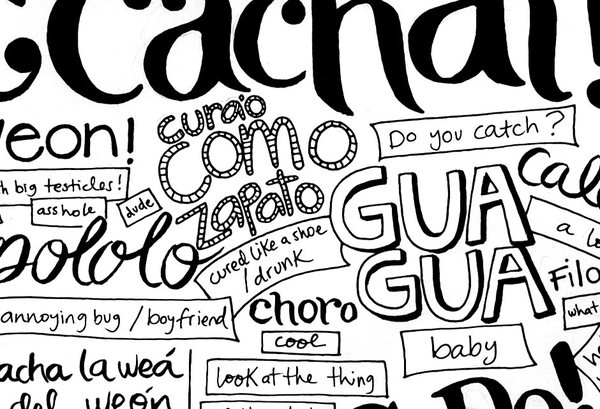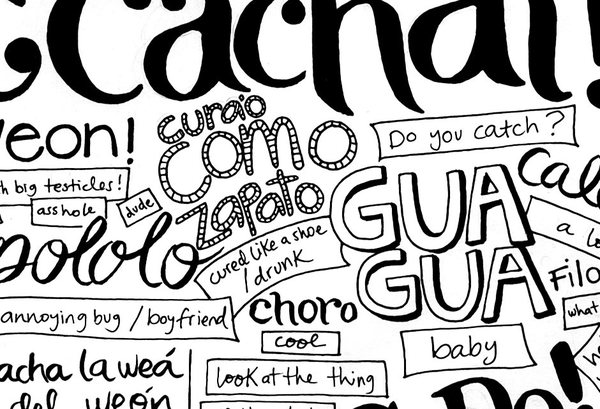No matter where you go, language barriers can be a problem. Even in the US from city to city, words can vary; though, we all speak English (more or less). Call it vernacular, colloquialisms, or idioms, slang can sometimes be impossible to understand.
In Chile, where I will be this summer, slang has evolved into a somewhat unique dialect of Spanish. All Spanish speaking countries, as far as I know, have their own variations of Español o Castellano (both mean Spanish), not to mention, accents and speech patterns. Colombians supposedly have the best pronunciation of Spanish in the Americas, Peruvians are said to speak extremely quickly (I can vouch for this), and Spaniards, like from Barcelona, have a wonderfully charming lisp etc.
Apparently, Chileans speak their own type of Spanish dubbed Chilenismo (or Chileno). It is spoken rapidly, full of unique, grammatical structures, and has a vocabulary that seems like a whole different language. It makes sense doesn’t it? I mean, this is the farthest Spanish has successfully traveled in its linguistic expansion; it’s understandable that Chilean Spanish would have the biggest variations to traditional vocabulary and grammar from Spain.
I am still excited and determined to spend my summer in Chile; however, it is frightening to think that my only useful means of communication could be ineffective. Learning Spanish at school, volunteering with Spanish speakers, and traveling abroad have prepared me in some ways, but I worry that my comprehension of Chilenismos will leave me dazed and confused. I have confidence they will be able to understand me, the other way around however, I worry. Oh well! Nothing more to do than study and speak more Spanish I guess. I bought a book specifically dedicated to this challenge and I think it is worth sharing. So on our first Chilenismo update, I am going to share some of my favorite ‘argot chileno’! Here they are …
My Current Favorite Chilenismos
cocoroco adj. – flirtatious
– It’s just fun to say.
la hawaiana (feminine noun) – flip flop (sandal)
– Let’s guess where this word came from?
¿Cómo le vaca? (phrase) – literally translated: How is the cow to you?, but it means How are you?
– Way more fun to say than ¿Cómo está usted?
Graciela – Thank you
– I swear I have heard this before somewhere else. Either way, more fun to say than gracias!
ganga (feminine noun) – marijuana
– Ganga means ‘bargain’ in the not Chilean version of Spanish. Let’s hope I don’t misuse this word too much in Chile.
pato (either a masculine noun or adj.) – kiss or broken, penniless
– Pato means ‘duck’. I have no clue how it came to mean any of these other words.
pulpo (masculine noun) – opportunist, exploiter, bellybutton
– Pulpo means ‘octopus’. What happened here?
and finally …
po (interjection) – emphatic “yes”
– My amazing AFS staff coordinator lady told me when she was in Chile and asked what/how to use ‘po’, the answer was along the lines of, “Po is po. You use it when you use it” (hence the emphatic I guess). I plan to use this from now on with all Spanish speakers. Even if they are Salvadoran and don’t understand me, I’m going to use it, so get ready chicos.
Fun Fact: My book lists over 35 different ways to say the penis in Chilenismo. It makes sense though that they have this many words for it. Think of how many euphemisms we have for it in English. Still though, did the author really need to write all of them? Personally, over 35 different ways to say penis in a single language doesn’t seem prudent or useful to document.
*It also lists over 15 different words for vagina
More Chilenismos to come! Chilenismos Dictionary & Phrasebook, where I got this slang, by Daniel Joelson is available online. I definitely recommend it!
Image source: http://www.marianamatija.com/Cachai
___________________________
Cartel ilustrado con argot chileno y su traducción al inglés para el fanzine Güelcom tu Chile.
Ejercicio académico desarrollado para el Postítulo en Ilustración de la Universidad Finis Terrae.
Illustration for poster with chilean slang and its english translation for the fanzine Güelcom tu Chile. Academic exercise developed for the postgraduate programme in Illustration of Universidad Finis Terrae.

